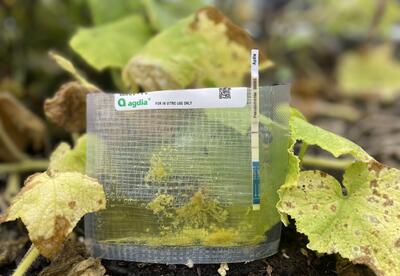
HSVd positive results on the AmpliFire fluorometer
--- FOR IMMEDIATE RELEASE ---
Agdia, Inc. (Elkhart, IN) has commercialized a rapid and user-friendly, RNA-based assay, on their AmplifyRP® XRT platform, for the detection and identification of Hop stunt viroid (HSVd).
Hop stunt viroid (Hostuviroid) causes serious disease in cultivated hops, Humulus lupulus. This sub-viral pathogen can reduce yields by up to 65% and affect quality through the reduction of alpha acids, the primary bittering agents in the cones. With the meteoric rise in popularity of craft breweries in the U.S., hops have become an important crop for the economies of several states, including Washington, Oregon, Idaho and Michigan. Hop stunt viroid was first identified in Japan in the 1970’s and has since been detected throughout Asia, Europe and North America. While hops are the primary hosts for HSVd, novel strains of this viroid are pathogenic on citrus and multiple Prunus species, including P. persica (peach) and P. domestica (common plum), causing economic damage. Moreover, HSVd causes latent infections in a wide range of natural hosts, creating reservoirs of inoculum in the absence of cultivated, economically important hosts.
Disease severity on hops is dependent on variety and environmental conditions. Typical symptoms include shortening of internodes (stunting), chlorosis and yellow speckling along and between leaf veins. Noticeable symptoms are known to take three to five growing seasons post infection to manifest on mature plants. This pathogen is spread locally on contaminated hand tools and equipment, whereas infected propagative materials are the vehicles of long-distance dispersal. This dissemination paradigm, in conjunction with the extended latency period, makes the diagnostic testing of planting materials paramount to successful management of HSVd. Viroids, like viruses, are not subject to curative therapies, and exclusion is the sole means of maintaining healthy plant inventories.
Agdia’s new AmplifyRP® XRT assay for HSVd is based on recombinase polymerase amplification (RPA) . This technology promotes the rapid amplification and detection of nucleic acid targets, DNA or RNA, while maintaining a single operating temperature of 39 - 42 oC. When paired with Agdia’s AmpliFire® isothermal fluorometer, the XRT system is a rapid, user-friendly tool that can be implemented in the field or the lab by personnel with limited experience in molecular diagnostics.
Agdia validated their new assay against an extensive collection of strains of HSVd, including those pathogenic on hops, citrus and Prunus species. Agdia states all strains were detected and identified consistently, during their analysis. Moreover, no cross-reactivity was observed with several closely related members of Pospiviroidae, including Chrysanthemum stunt viroid (CSVd), Citrus exocortis viroid (CEVd), Columnea latent viroid (CLVd), Mexican pepita viroid (MPVd), Pepper chat fruit viroid (PCFVd), Potato spindle tuber viroid (PSTVd) and Tomato chlorotic dwarf viroid (TCDVd). Agdia states their AmplifyRP® assay for HSVd detection is comparable to all available molecular diagnostics, in sensitivity and specificity.
The introduction of this assay brings Agdia’s catalog to 14 assays on the AmplifyRP ® platform. High levels of market demand for field-deployable, plant pathogen detection products have driven this output, and Agdia maintains they will continue to expand their product offerings. They state the HSVd assay is the first of several AmplifyRP® products to be released in 2020. For more information on Agdia’s complete line of AmplifyRP® assays, please visit Agdia’s website www.agdia.com.
About Agdia
A leading provider of diagnostic solutions for agriculture, Agdia, Inc. has been serving plant breeders, propagators, growers, universities, regulatory organizations and private testing laboratories since 1981. The company offers a comprehensive portfolio of validated, easy-to-use diagnostics for identifying plant pathogens, plant hormones, and transgenic traits. Moreover, Agdia operates an ISO accredited, in-house, testing services laboratory. Agdia’s quality management system is ISO 9001:2015 certified and their Testing Services Laboratory is ISO 17025:2005 accredited. Visit the company’s website at www.agdia.com, e-mail info@agdia.com, phone 1-574-264-2615 (toll-free 800-622-4342) or fax 1-574-264-2153.
About AmplifyRP®
AmplifyRP® XRT and AmplifyRP® Acceler8® test kits employ recombinase polymerase amplification (RPA) technology licensed by Agdia, Inc (licensee) from TwistDx Limited, U.K (licensor). Use of the RPA process and probe technologies are protected by US patents 7,270,981 B2, 7,399,590 B2, 7,435,561 B2, 7,485,428 B2 and foreign equivalents in addition to pending patents.
AmplifyRP® and AmpliFire® are registered trademarks of Agdia, Inc.
###





